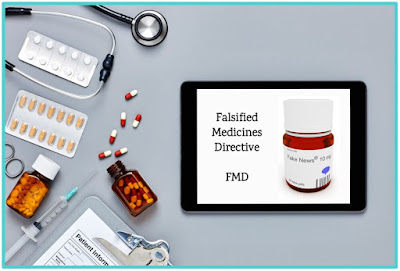Substandard
and Falsified (SF) Medical Products represent a dangerous global problem.
There is quite a good video explaining the problem and the World Health
Organization have a factsheet and links to further resources here.
A Falsified Medicines Directive (FMD) was adopted in
2011, aiming at guaranteeing the safety and quality of medicines sold in the
European Union (EU). The final stage of this initiative was adopted on 9
February 2019 when new rules on safety features for prescription medicines sold
in the EU were applied. This link will also provides information about global
falsified medicines directives in progress around the world, this is certainly
not just a UK or EU issue.
The UK is governed by the EU directive just now and these rules mean that the industry has to affix a 2-D barcode and an anti-tampering device on the box of prescription medicines. The EU published a video to explain the safety features. An explanation has been published on the GOV.UK website regarding 'How the Falsified Directive Works'. NHS Digital has a great deal of information - Falsified Medicine Directive implementation toolkits here PHE have also published a document 'FMD guidance for recipients of PHE supplied vaccines here.
This blog is aiming to provide basic information about the FMD - I have found it a complex subject and am no expert. I hope the links provided will give you additional resources to research and understand the subject.
Information about this development was published in the April edition of Vaccine Update (page 11). It said that vaccines used in the National immunisation programme would come under this new regulation and in practice this means that at the end of the supply chain before a vaccine is administered to a patient, the integrity of the product seal should be checked and the barcode on the packaging should be scanned to verify authenticity and register the removal of the product from the supply chain on a central database - this is the process of decommissioning.
The database for the UK is called the National Medicines Verification System (NMVS), supplied by a company called SecurMed UK, which comprises bodies representing manufacturers, importers, wholesalers and pharmacies. Community pharmacy is represented on SecurMed UK jointly by the National Pharmacy Association and the Company Chemists' Association. The SecurMed website has helpful information as does the ABPI.
Article 23 of the Directive found on page 28 provides Member States with legal flexibility regarding their respective supply chains about where the decommissioning process should take place. Additional guidance on 'Article 23 providers', 'Healthcare Institutions' and 'Article 26 exemption' was published by the Medicines & Healthcare products Regulatory Agency (MHRA) in December 2018 - see here.
Within this document is says the UK has classed General Practitioners (GPs) as health centres and therefore healthcare institutions - that includes both dispensing and non-dispensing GPs. Therefore GP surgeries must decommission medicines. Here is a toolkit which has been produced for General Practice.
Travel clinics are not defined in the further guidance about Article 23. So the first thing is to assess the supply of the vaccines to the clinic whether directly from a manufacturer, wholesaler or pharmacy. Article 23 then raises the question if they are regarded as a healthcare institution or pharmacy. What is unclear is if the determination of a healthcare institution covers private travel clinics. I've been discussing with colleagues and have made some further enquiries. If and when I find out more I'll update this blog. The general feeling just now from these discussions is that private travel clinics would probably need to decommission the vaccines and any other drugs administered or supplied to travellers they see in a consultation.
Having searched the online FaceBook forums for 'discussion' on this subject, there was limited information but what seems clear is that GP surgeries have nothing implemented as yet and little to no information has been forthcoming from their CCGs (from those that commented). Private travel clinics also seem in a state of flux as to what should happen, but some clinics and community pharmacies have scanners already in place.
And then of course the chaotic developments regarding Brexit create another big question since this is an EU Directive. But whatever happens on that in the future, the UK has and must continue to have a process in place on this important aspect of patient care. The government updated a page on 'How we propose to regulate medicines if there is a no-deal Brexit' yesterday here but I didn't read anything further on FMD.
I’m guessing for now the next thing is to continue to increase your knowledge of this important initiative, watch out for news from your CCG or Health Board or private travel clinic owners and eventually we will hear what exactly is to happen!

No comments:
New comments are not allowed.